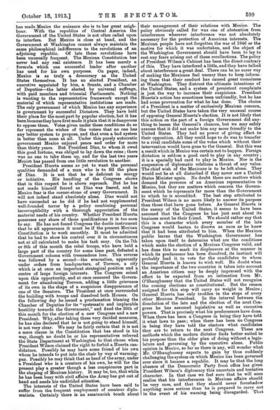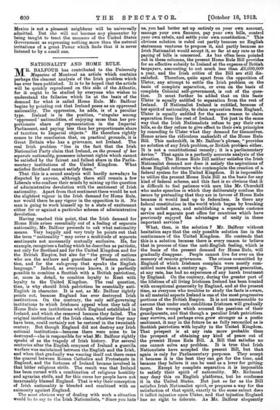MEXICO AND THE UNITED STATES.
"J OUTH AMERICA," says Mr. Bryce, "begins at the kJ Rio Grande del Norte." It is this unfortunate difference between physical and political geography that has made Mexico the nuisance she is to her great neigh- bour. With the republics of Central America the Government of the United States is not often called upon to interfere. But Mexico is close at hand, and the Government at Washington cannot always maintain the same philosophical indifference to the revolutions of an adjoining republic. Of late these revolutions have been unusually frequent. The Mexican Constitution has never had any real existence. It has been merely a formula which one successful leader after another has used for his own purposes. On paper, indeed, Mexico is as truly a democracy as the United States themselves. It has an elected President, an executive appointed by him, a Senate, and a Chamber of Deputies—the latter elected by universal suffrage, with paid members and triennial Parliaments. Nothing is wanting to the representative framework except the material of which representative institutions are made. The only government of which Mexico has any experience is government by successful Dictators. They have held their place for the most part by popular election, but it has beenbecause they have first made it plain that it is dangerous to oppose them. Votes given under these conditions do so far represent the wishes of the voters that no one has any better system to propose, and that even a bad system is better than none at all. Under this purely autocratic government Mexico enjoyed peace and order for more than thirty years. But President Diaz, to whom it owed this good fortune, was obliged to lay down the reins ; there was no one to tale them up, and for the last two years Mexicb has passed from one little revolution to another.
President Huerta seems as yet to want the personal qualities demanded of a man who is to fill the place of Diaz. It is not that he is deficient in energy or initiative. His handling of the Congress shows that in this respect he is above reproach. But he has not made himself feared as Diaz was feared, and in Mexico fear is the corner-stone of every Government. It will not indeed stand absolutely alone. Diaz would not have succeeded as he did if he had not supplemented well-founded terror by a policy combining personal incorruptibility with a thorough appreciation of the material needs of his country. Whether President Huerta possesses any share of these qualifications it is too soon to say. He has not found Congress the docile instrument that to all appearance it must be if the present Mexican Constitution is to work smoothly. It must be admitted that lie had to show his control over it in circumstances not at all calculated to make his task easy. On the 7th or 8th of this month the rebel troops, who have held a large part of the country for some time past, defeated a Government column with tremendous loss. This reverse was followed by a second—the evacuation, apparently under orders from headquarters, of Torreon, a city which is at once an important strategical position and a centre of large foreign interests. The Congress seized upon this opportunity, and at once censured the Govern- ment for abandoning Torreon, adding a little grievance of its own in the shape of a suspicious disappearance of one of the Senators. The President at once surrounded the building with troops and dissolved both Houses. On the following day he issued a proclamation blaming the Chamber of Deputies for its "systematic and implacable hostility towards the Government," and fixed the 26th of this month for the election of a new Congress and a new President. Why, after taking these very decided measures, he has also declared that he is not going to stand himself, is not very clear. We may be fairly certain that it is not a mere clause in the Constitution that has stood in his way, though no doubt he or his representatives referred the State Department at Washington to that clause when President Wilson claimed the right to forbid a Huerta can- didature. Possibly he may have some friend of his own whom he intends to put into the chair by way of warming pan. Possibly he may think that as head of the army, under a President who is a creature of his own, he will for the present play a greater though a less conspicuous part in the shaping of Mexican history. It may be, too, that while he has been busy with civil affairs the Army has got out of hand and. needs his undivided attention.
The interests of the United States have been said to suffer from the frequent employment of amateur diplo- matists. Certainly there is an amateurish touch about their management of their relations with Mexico. The policy obviously called for was one of abstention from interference wherever interference was not absolutely necessary for the protection of American interests. The Mexican people have not forgotten the war of 1846 or the motive for which it was undertaken, and the object of the Washington Government should have been to lay to rest any fears arising out of these recollections. The policy of President Wilson's Cabinet has been the direct contrary of this. They have interfered a little, and they have talked about interference a great deal. There can be no surer way of making the Mexicans feel uneasy than to keep inform- ing them that their conduct has caused great uneasiness at Washington. They distrust the ultimate intentions of the United States, and a system of persistent complaints is just the way to increase their suspicions. President Huerta's action has sometimes been unfriendly, but he has had some provocation for what he has done. The choice of a President is a matter of exclusively Mexican concern, but the United States have taken the very unusual course of opposing General Huerta's election. It is not likely that this action on the part of a foreign Government did any- thing to lessen the General's chances, but we may safely assume that it did not make him any more friendly to the United States. They had no power of giving effect to their opposition. All they could hope to do was to transfer to a rival candidate some of the votes which without their intervention would have gone to the General. But this was a result which in Mexico was certain not to happen. Foreign dictation is seldom a good card to play in any country ; it is a specially bad card to play in Mexico. Nor is the suspension of diplomatic relations a threat of any value. The chief wish of the Mexicans is to be left alone. They would not be at all disturbed if they never saw a United States Minister again. No doubt there are matters which demand the presence of an American representative in Mexico, but they are matters which concern the Govern- ment which he represents far more than the Government to which lie is accredited. The last step attributed to President Wilson is no more likely to answer its purpose than those that have gone before. As General Huerta is the enemy of the United States, it seems to have been assumed that the Congress he has just sent about its business must be their hiend. We should rather say that this is a character which every member of the late Congress would hasten to disown as soon as be knew that it had been attributed to him. When the Mexican public learns that the Washington Government has taken upon itself to determine what are the conditions which make the election of a Mexican Congress valid, and has done this to mark its displeasure at the manner in which its predecessor has been dissolved, its instinct will probably lead it to vote for the candidates to whom General Huerta is known to wish well. No doubt when the importance of the two countries is taken into account an .American citizen may be deeply impressed with the effect to be expected from an intimation from Mr. O'Shaughnessy that the United States will not recognize the coming elections as constitutional. But the reason assigned for this step will carry no weight in Mexico ; General Huerta has only trodden in the steps of every other Mexican President. In the interval between the dissolution of the late and the election of the next Con- gress he has assumed legislative as well as executive powers. That is precisely what his predecessors have done. When there has been a Congress in being they have told it what laws to pass ; when there has been no Congress in being they have told the electors what candidates they are to return to the next Congress. These are methods which the modern dictator finds better suited to his purpose than the older plan of doing without a legis- lature and governing by the executive alone. Public opinion in Mexico, so far as there is any, will wonder what Mr. O'Shaughnessy expects to gain by thus suddenly challenging the system on which Mexico has been governed ever since it became a, republic. It may be that the long absence of the Democratic Party from office has given President Wilson's diplomacy this uncertain and tentative character. In that case we feel sure that he will soon realize that his interferences in Mexican affairs should be very rare, and that they should never foreshadow anything more serious than he is prepared to carry out in the event of his warning being disregarded. That Mexico is not a pleasant neighbour will be universally admitted. But she will not become any pleasanter by being taught to treat the menaces of the United States Government as expressing nothing more than the natural irritations of a great Power which finds that it is never listened to by a small one.
















































 Previous page
Previous page